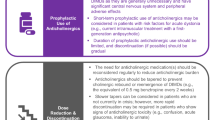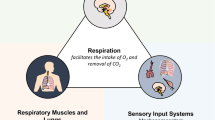Abstract
The effect of (-)-deprenyl, a rapidly acting selective monoamine oxidase (MAO) B inhibitor, on the sleep and mood of six healthy young male adults was investigated. The drug was administered double-blind in a balanced cross-over design. The dose (5–10 mg/day for 3 days) was chosen to cause complete inhibition of MAO, a process which usually takes 1–2 weeks with conventional MAO inhibitors. The inhibition was monitored by measuring platelet MAO activity and phenylethylamine excretion. Urinary phenylethylamine concentration was raised in all subjects. Subjects were unaware of any sleep disturbance due to the drug although the electroencephalogram (EEG) showed increased wakefulness. The onset of rapid-eye-movement (REM) sleep was delayed and the total amount reduced; the amount of stage 2 sleep was increased. The only effect of the drug on mood was to decrease the level of alertness prior to sleep. There was a slight but significant increase in the pre-sleep systolic blood pressure. There were no effects due to drug withdrawal.
Similar content being viewed by others
References
Akindele MO, Evans JI, Oswald I (1970) Mono-amine oxidase inhibitors, sleep and mood. Electroencephalogr Clin Neurophysiol 29:47–56
Birkmayer W, Riederer P, Youdim MBH, Linauer W (1975) Potentiation of the anti-akinetic effect after l-dopa treatment by an inhibitor of MAO-B, deprenil. J Neurol Transm 36:303–323
Blau K, Claxton IM, Ismahan G, Sandler M (1979) Urinary phenylethylamine excretion; Gas chromatographic assay with electron-capture detection of the pentafluorobenzoyl derivative. J Chromatogr 163:135–142
Elsworth JD, Glover V, Reynolds GP, Sandler M, Lees AJ, Phupradit P, Shaw KM, Stern GM, Kumar P (1978) Deprenyl administration in man: A selective monoamine oxidase B inhibitor without the ‘cheese effect’. Psychopharmacologia 57:33–38
Glover V, Sandler M, Owen F, Riley GJ (1977) Dopamine is a monoamine oxidase B substrate in man. Nature 265:80–81
Herbert M, Johns MW, Doré C (1976) Factor analysis of analogue scales measuring subjective feeling before and after sleep. Br J Med Psychol 49:373–379
Innes IR, Nickerson M (1977) Nor-epinephrine, epinephrine and the sympathomimetic amines. In: Goodman LS, Gilman A (eds) The pharmacological basis of therapeutics. MacMillan, New York p 477
Johnston JP (1968) Some observations upon a new inhibitor of monoamine oxidase in brain tissue. Biochem Pharmacol 17:1285–1297
Knoll J Analysis of the pharmacological effects of selective monoamine oxidase inhibitors. In: Wolstenholme GEW, Knight J (eds) Monoamine oxidase and its inhibition. Elsevier, Amsterdam, p 135
Knoll J (1978) The possible mechanisms of action of (-)-deprenyl in Parkinson's disease. J Neurol Transm 43:177–198
Kupfer DJ, Bowers MB (1972) REM sleep and central monoamine oxidase inhibition. Psychopharmacologia 27:183–190
Lees AJ, Shaw KM, Kohout LJ, Stern GM, Elsworth JD, Sandler M, Youdim MBH (1977) Deprenyl in Parkinson's disease. Lancet II:791–796
Lewis SA (1970) Comparative effects of some amphetamine derivatives of human sleep. In: Costa E, Garattini, S (eds) Amphetamines and related compounds. Raven Press, New York, p 873
Rechtschaffen A, Kales A (eds) (1968) A manual of standardized terminology, techniques and scoring system for sleep stages of human subjects. U.S. Public Service, Washington, D.C.
Reynolds GP, Elsworth JD, Blau K, Sandler M, Lees AJ, Stern GM (1978) Deprenyl is metabolised to methamphetamine and amphetamine in man. Br. J. Clin. Pharmacol 6:542–544
Riederer P, Youdim MBH, Rausch WD, Birkmayer W, Jellinger K, Seeman D (1978) On the mode of action of l-deprenyl in the human central nervous system. J Neural Transm 43:217–226
Robinson DS, Lovenberg W, Keiser H, Sjoerdsma A (1968) Effects of drugs on human blood platelets and plasma amine oxidase activity in vitro and in vivo. Biochem Pharmacol 17:109–119
Varga E, Tringer I (1967) Clinical trial of a new type of promptly acting psychoenergetic agent (phenyl-isopropylmethyl-propinylamine-HCl.E-250). Acta Med Acad Sci Hung 23:289–295
Williams RL, Karacan I, Hursch CJ (eds) (1974) Electroencephalography (EEG) of human sleep: Clinical applications. John Wiley, New York
Wyatt RJ, Fram DH, Kupfer DJ, Snyder F (1971) Total prolonged drug-induced REM sleep suppression in anxious-depressed patients. Arch Gen Psychiatry 24:145–144
Wyatt RJ, Kupfer DJ, Scott J, Robinson DS, Snyder F (1969) Longitudinal studies of the effect of monoamine oxidase inhibitors on sleep in man. Psychopharmacologia 15:236–233
Yang HYT, Neff NH: (1973) β-Phenylethylamine: a specific substrate for type B monoamine oxidase of brain. J Pharmacol Exp Ther 187:365–371
Author information
Authors and Affiliations
Rights and permissions
About this article
Cite this article
Thornton, C., Doré, C.J., Elsworth, J.D. et al. The effect of deprenyl, a selective monoamine oxidase B inhibitor, on sleep and mood in man. Psychopharmacology 70, 163–166 (1980). https://doi.org/10.1007/BF00435308
Received:
Issue Date:
DOI: https://doi.org/10.1007/BF00435308




